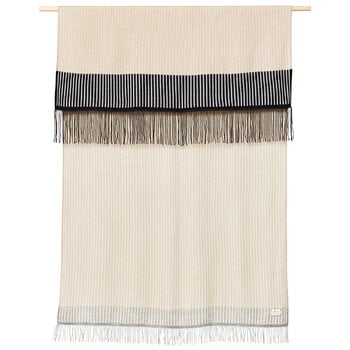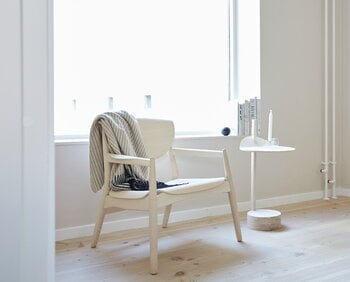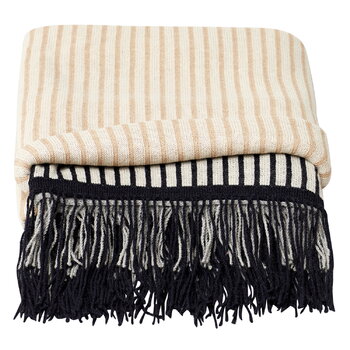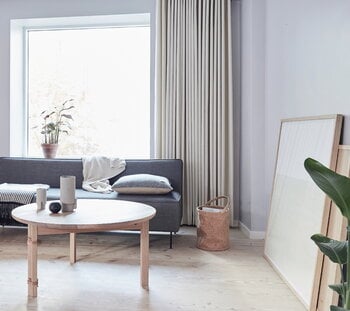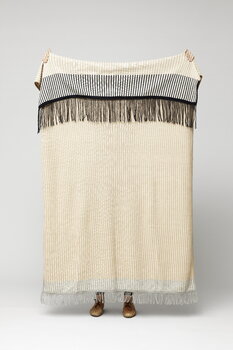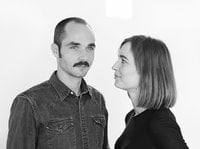The Danish Form & Refine’s Aymara blanket, designed by Herman Studio, is part of a textile collection made from luxuriously soft and fine alpaca wool. The designers were inspired by their trip to South America: the wool comes from Bolivia and has been woven by local artisans. The hypoallergenic alpaca wool feels pleasant against the skin and acts as a natural thermostat, storing heat for a long period of time. The beautiful colours and simple patterns reflect both Nordic design and Bolivian handicraft traditions.
Aymara plaid, 190 x 130 cm, pattern Stripes
Form & Refine
Description
The Danish Form & Refine’s Aymara blanket, designed by Herman Studio, is part of a textile collection made from luxuriously soft and fine alpaca wool. The designers were inspired by their trip to South America: the wool comes from Bolivia and has been woven by local artisans. The hypoallergenic alpaca wool feels pleasant against the skin and acts as a natural thermostat, storing heat for a long period of time. The beautiful colours and simple patterns reflect both Nordic design and Bolivian handicraft traditions.
Product details (6)
- Material
- 100% super fine alpaca wool
- Colour
- Cream, light brown, dark blue and light grey
- Length
- 190 cm
- Width
- 130 cm
- Weight
- 0.82 kg
- Care instructions
- Dry clean or hand wash with warm water, preferably with shampoo. Dry flat, do not hang. Do not machine wash.
- Product ID
Designer
Herman Studio is a Danish design office specializing in furniture and interior design. It was founded in 2011 by Helle Herman Mortensen, who has studied Industrial Design at Aalborg University, and Jonas Herman Pedersen, who specialized in furniture and space design at Aarhus School of Architecture. In their designs, Mortensen emphasizes storytelling and multitude of perspectives, and Pedersen is fascinated by production methods and the holistic manufacturing process from raw material to the final product. The duo’s design are often finely balanced combinations of elegant and powerful elements with room for quirky details and surprises, too.
View all productsReviews (0)
Sustainability
The Product Sustainability Framework, our criteria of sustainable design, helps you find the most sustainable products in our selection. Read below which sustainability criteria this product has met.
Working conditions & labour 7/9
-
Equal opportunities for all employees
-
Commitment to UN Global Compact, fair compensation for all employees
-
Corporate responsibility requirements defined and communicated for suppliers
-
Systematic work for improved inclusion and well-being in the workplace
-
Transparent supply chain
-
Suppliers' compliance to a code of conduct ensured
-
Compliance to the UN Guiding Principles on Business and Human Rights ensured in the supply chain
-
Direct suppliers audited and certified
-
Support for community involvement in the supply chain
Eco-friendly production 9/9
-
Fair and resource-wise water-use in production
-
No incineration or landfilling of returned items
-
No use of endangered species as materials
-
No direct environmental emissions or waste (excl. GHGs) from production
-
The sustainability of direct suppliers' production is addressed and monitored
-
Production and material sourcing that respect biodiversity, animal rights, and natural ecosystems
-
Material-efficient and ecological packaging
-
Positive impact on nature’s well-being through operations that regenerate natural ecosystems
-
No potentially harmful chemicals used in own production
Climate impact 6/8
-
Company's direct greenhouse gas emissions identified and commitment to reduction
-
Product's carbon impact identified and commitment to reduction
-
Guidance on energy- and eco-efficient use of the product
-
Contribution to climate initiatives beyond the brand’s direct operations
-
Low-carbon or compensated transportation
-
Carbon neutral or carbon negative product
-
Carbon footprint of the product calculated and goals set to reduce it
-
100 % renewable energy in own production and operations
Sustainable materials 6/6
-
Sustainable and long-lasting material choices
-
No harmful or hazardous substances
-
Responsible raw material sourcing and production
-
Materials suited for circularity: monomaterials, recyclable finishings, renewable or recycled contents etc.
-
Ecological materials: natural, biodegradable, recyclable or recycled contents
-
Outstanding materials in terms of innovativeness, responsibility, sustainability and circularity: local production or sourcing, 100 % recycled content, C2C-certification etc.
Circular design 4/5
-
High aesthetic quality promoting long-term use of the product
-
Technically durable product design and material choices
-
Design for enduring life-long quality
-
Design and support for product maintenance, repair and upgradability
-
Innovative circular design solutions: circular service system, resale platform, remanufacturing, collection of used products, etc.
